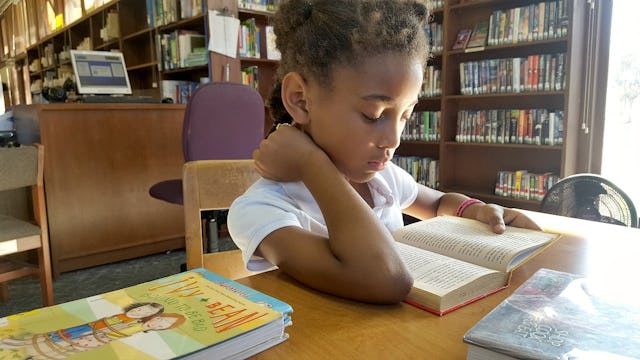When Your Child Struggles With Reading

Reading was my superpower when I was growing up. As a kid, I would devour books, half a dozen at a time every single week. My reading level tests were always grades above the one I was currently in throughout elementary school, and years later not much has changed. Books are still life to me. That’s why I was surprised when I finally had a child of my own reading didn’t come as naturally to her.
It wasn’t that I was expected my daughter to be just like me, but I figured bookworms beget bookworms, you know? As I figured it, she was genetically disposed to be good at reading because I was.
That was not the case.
Well, not at first.
Before she was born, I’d read to my little girl, rubbing my belly to emphasis the good parts. As a baby and toddler, she had a bookshelf filled to overflowing. She loved to grab a stack of books and bring them to me to read to her and would listen attentively far longer than expected of someone her age.
As she got older and started to learn to read on her own, things changed. Books, which previously brought her so much joy, suddenly became a source of stress. Making sense of letters and sounds was a challenge for her. As she worked through pronunciation, a simple directive to “sound it out” could easily lead to tears. She was persistent, though, and my smart girl eventually learned to read.
That’s when the real hard part came. While she was finally able to read, she wasn’t comprehending what the words meant. Because of that, reading wasn’t fun for her. She didn’t see the point because she didn’t understand the point. She still loved for me to read to her, and discovered graphic novels which gave great context clues thanks to the pictures. Anything beyond that, trying to get her to read for fun was like was like pulling teeth. She didn’t want to because it didn’t make her feel good.
Before you can come up with a plan for helping your child overcome their reading challenges, you’ll want to get an assessment. I gotta warn you, private reading assessments can be expensive. I talked to my daughter’s teacher first, and she gave me some specific insight on what the problem was. There are a number of reasons your child might be struggling, It could be a learning disability or that they need to slow down. They could be having a hard time because they aren’t reading material that’s interesting to them. A teacher or reading specialist can help you determine what’s going on.
We realized that my daughter needed more intentional reading time. Her schedule was busy, and during her free time she was playing games on her tablet. When it came time to read, she felt rushed. Because of that, she would scan the pages of a book, picking up pieces of the story. It was no wonder she was struggling with comprehension. My husband and I drastically decreased her screen time so she had more time to engage with books, especially books she chose and wanted to read. Check your kid’s habits to see if it’s conducive to being a better reader. Screens, packed schedules, and lack of content they want to read can all lead to a kid struggling.
Making reading a part of your family life is important, too. A kid who is having a hard time reading needs to see their parents reading. They still need to be read to, and books need to be available for them. You definitely want to stay stocked up on books they want to read, but you should also keep some around that will challenge them. My daughter still loves graphic novels and we encourage her to read as many of those as possible. Really, when a kid finds written content they can engage with, as long as it’s age appropriate, let them go crazy. I’m always keeping my eyes open for chapter books around topics that I know she’d be interested in so that she can challenge herself and become better, but when we go to the library 90% of her selections are still comics or graphic novels, and I’m okay with that.
It’s going to be critical to show your child that reading doesn’t have to be boring. When they’re struggling and trying to figure things out, it’s hard work. They need to know that the bright light at the end of the dark tunnel is that reading is fun. When I was in school, I loved to do DEAR (Drop Everything And Read) where we could sit anywhere we wanted to read books, even under the table. You can even try Educator Ekuwah Moses’ weekly reading log that includes tasks like reading in a bathtub to reading with a family member via Facetime or Skype.
When reading is a challenge for your kid, especially if you’re an avid reader yourself, it can feel like you’re failing them. We know that reading can open up the world and being literate is the foundation that success is built on. It’s a lot of pressure. Although it may feel like it, having a child who struggles with reading is not the end of the world. Thanks to my daughter’s determination, collaboration with school partners, and lots and lots of work, my girl has become a bookworm just like her mama.
This article was originally published on